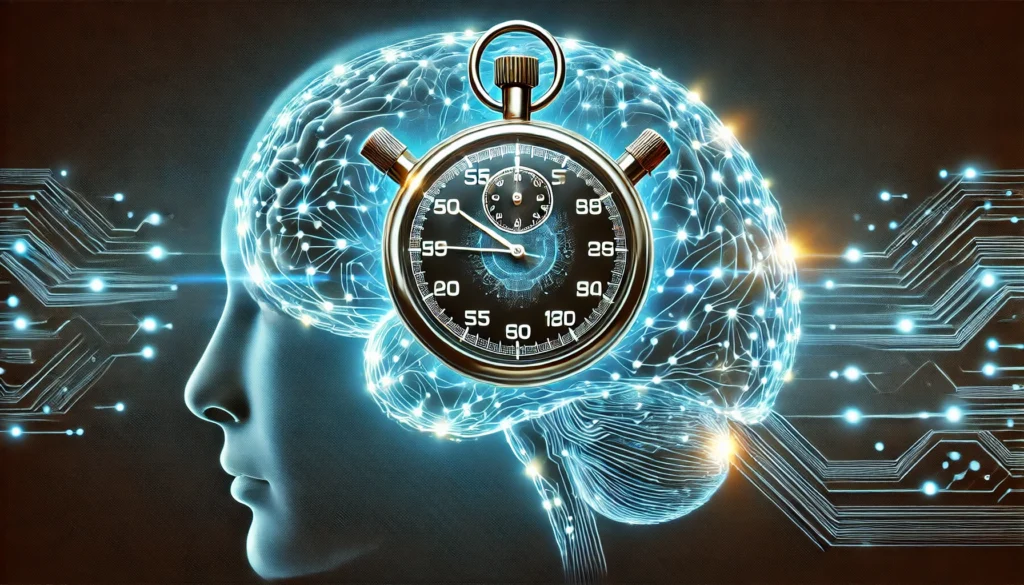Cognitive processing speed refers to the rate at which the brain can receive, interpret, and respond to information. It’s a key component of overall cognitive function, affecting everything from learning and memory to problem-solving and decision-making.
You may also like: Effective Techniques for Short Term Memory Boost
Defining Cognitive Processing Speed
Cognitive processing speed is a measure of how quickly an individual can perceive, interpret, and respond to information. This speed varies from person to person, influenced by a combination of biological and environmental factors. Faster processing speed can lead to quicker decision-making and problem-solving capabilities, which are crucial in many aspects of life.
Factors Affecting Processing Speed
Several factors influence cognitive processing speed, including genetics, age, health status, and lifestyle choices. Genetics can play a role in determining baseline processing speeds, while lifestyle factors such as diet, exercise, and mental engagement can affect how these speeds change over time. Understanding these influences can help individuals optimize their cognitive functions.
The Role of Brain Structure
The architecture of the brain significantly impacts processing speed. Neural pathways and the efficiency of synaptic transmissions determine how quickly information is processed. As we age, changes in brain structure can affect these pathways, but engaging in activities that promote brain health can help maintain or even improve processing speeds.
How Do Changes in the Brain Impact Processing Speed?
The brain’s processing speed can be influenced by a range of factors, including age, health conditions, and lifestyle choices. As we age, it’s natural for certain cognitive processes to slow down due to changes in brain structure and function. However, this isn’t a universal rule, and there are ways to mitigate this decline.
Aging and Cognitive Decline
Aging is often accompanied by a natural decline in processing speed, attributed to changes in brain volume and synaptic density. However, research suggests that this decline can be slowed or even reversed with targeted interventions. Regular cognitive challenges and a healthy lifestyle can significantly mitigate age-related cognitive decline.
Health Conditions and Brain Speed
Various health conditions, such as cardiovascular diseases, diabetes, and neurological disorders, can negatively impact brain processing speed. These conditions may lead to reduced blood flow or damage to brain cells, thereby slowing cognitive functions. Managing these health conditions through medical interventions and lifestyle changes is essential for maintaining cognitive speed.
Lifestyle Choices and Their Impact
Lifestyle choices, including diet, exercise, and stress management, play a crucial role in determining brain processing speed. A sedentary lifestyle, poor dietary habits, and chronic stress can hinder cognitive performance. Conversely, a balanced lifestyle that includes regular physical activity and a nutritious diet can enhance brain function and processing speed.
Why Is My Brain So Slow?
Many people wonder, “Why is my brain so slow?” or “Why do I experience a slow brain?” Factors like stress, fatigue, poor nutrition, and lack of physical activity can impact cognitive processing speed. Moreover, specific medical conditions, such as depression, anxiety, or neurological disorders, may also play a role.
Identifying the Symptoms of Slowed Processing
Slowed processing speed can manifest in various ways, such as difficulty in concentrating, slower decision-making, or a lag in problem-solving. Recognizing these symptoms early can help individuals seek interventions that may improve their cognitive performance. Understanding personal patterns of cognitive function is key to addressing these issues effectively.
Stress and Its Effects on the Brain
Chronic stress is a significant contributor to reduced cognitive processing speed. Stress hormones like cortisol can interfere with brain function, leading to slower processing speeds. Incorporating stress management techniques, such as mindfulness or relaxation exercises, can have a positive impact on cognitive health.
The Importance of Sleep and Nutrition
Adequate sleep and proper nutrition are critical for maintaining optimal cognitive processing speed. Sleep deprivation and poor diet can lead to fatigue and reduced cognitive function. Ensuring a diet rich in essential nutrients and getting sufficient rest can enhance brain speed and overall cognitive health.

Debunking Myths About Brain Processing Speed
Myth 1: Brain Speed Declines Irreversibly with Age
While it’s true that certain cognitive functions may decline with age, research indicates that lifestyle interventions, such as regular physical activity and mental exercises, can help maintain and even improve processing speed.
Challenging Age-Related Decline
The notion that cognitive decline is inevitable with age is a common misconception. Research has shown that engaging in regular physical and mental activities can significantly counteract age-related cognitive decline. Activities like walking, swimming, and brain games can enhance neural connectivity and processing speed.
The Impact of Neuroplasticity
Neuroplasticity, the brain’s ability to reorganize itself by forming new neural connections, plays a crucial role in maintaining cognitive speed. This adaptability allows the brain to compensate for age-related changes and maintain functionality. Learning new skills or languages can stimulate neuroplasticity, enhancing processing speed.
Success Stories of Aging Individuals
Many individuals have defied the stereotype of cognitive decline by maintaining active and engaged lifestyles. These success stories highlight the potential to preserve and even enhance cognitive function well into old age. By focusing on healthy habits, anyone can improve their cognitive processing speed and overall brain health.
Myth 2: Once Slow, Always Slow
People often believe that if they experience a slow brain or mind processing speed, it’s a permanent state. However, the brain is remarkably adaptable, thanks to neuroplasticity. With the right interventions, you can enhance your cognitive processing speed at any age.
The Science of Brain Adaptability
The human brain is highly adaptable, capable of changing and improving throughout life. Neuroplasticity allows for the formation of new neural pathways, enabling the brain to overcome slow processing speeds. This adaptability is a powerful tool for enhancing cognitive performance at any age.
Strategies for Enhancing Processing Speed
Various strategies can be employed to enhance processing speed, including cognitive training programs, physical exercise, and dietary improvements. These interventions stimulate brain activity, encouraging the development of new neural pathways that can enhance processing speed. Consistency and commitment to these strategies can yield significant improvements.
Personal Stories of Cognitive Improvement
Numerous individuals have successfully improved their cognitive processing speeds through targeted interventions. These personal stories serve as inspiration and evidence that slow processing speed is not a permanent state. With dedication and the right strategies, anyone can achieve cognitive improvement.
Myth 3: Speed Equals Intelligence
Processing speed is just one facet of cognitive function and doesn’t necessarily correlate with intelligence. Individuals with slower processing speeds can still possess high levels of intelligence and problem-solving skills.
Understanding the Complexity of Intelligence
Intelligence is a multifaceted construct that encompasses various cognitive abilities, including reasoning, problem-solving, and creativity. Processing speed is just one component and does not solely determine intelligence. Many individuals with slower processing speeds excel in other areas of intelligence, demonstrating that speed is not the sole indicator of cognitive capability.
Different Types of Intelligence
There are multiple types of intelligence, such as linguistic, logical-mathematical, spatial, and emotional intelligence. Each type involves different cognitive processes and skills, highlighting that intelligence cannot be reduced to processing speed alone. Appreciating the diversity of intelligence types can lead to a more comprehensive understanding of cognitive abilities.
Real-World Examples of Diverse Intelligence
Many successful individuals have demonstrated high levels of intelligence despite slower processing speeds. These examples illustrate that cognitive processing speed does not define one’s potential or capabilities. By recognizing the value of different types of intelligence, we can appreciate the full spectrum of human cognitive abilities.
Fact-Checking: Cognitive Processing Speed
Fact 1: Neurological Speed Varies
Neurological speed, or the brain’s processing speed, can vary widely among individuals and can be influenced by genetic factors, environmental conditions, and personal habits.
Genetic Influences on Processing Speed
Genetic factors play a significant role in determining baseline processing speeds. Some individuals may inherit traits that predispose them to faster or slower cognitive processing. Understanding these genetic influences can help individuals tailor interventions to optimize their cognitive performance.
Environmental and Lifestyle Factors
Environmental factors, such as exposure to toxins or chronic stress, can impact neurological speed. Additionally, lifestyle habits, including diet and exercise, can either enhance or hinder processing speed. Recognizing and modifying these factors can lead to improvements in cognitive function.
The Role of Individual Differences
Individual differences in processing speed highlight the diversity of cognitive functioning. These differences are influenced by a combination of genetic, environmental, and lifestyle factors, underscoring the importance of personalized approaches to cognitive enhancement.

Fact 2: Diet and Exercise Matter
A balanced diet rich in omega-3 fatty acids, antioxidants, and vitamins, combined with regular physical exercise, can significantly improve brain processing speed and overall cognitive health.
Nutritional Elements for Brain Health
Certain nutrients are essential for optimal brain function, including omega-3 fatty acids, antioxidants, and vitamins like B6, B12, and E. These nutrients support neural health, enhance synaptic connectivity, and protect against cognitive decline. Incorporating these elements into your diet can promote faster processing speeds.
Exercise and Cognitive Enhancement
Physical exercise has been shown to increase blood flow to the brain, promoting the growth of new neurons and enhancing synaptic plasticity. Regular physical activity, whether aerobic or strength training, can significantly improve cognitive processing speed and overall brain health. Exercise routines should be tailored to individual preferences and capabilities for maximum benefit.
Combining Diet and Exercise for Optimal Results
The synergistic effects of a healthy diet and regular exercise can lead to substantial improvements in cognitive processing speed. By adopting a holistic approach that combines these elements, individuals can enhance their brain health and cognitive performance. This integrated strategy is key to achieving long-term improvements in processing speed.
Fact 3: Mental Exercises Enhance Processing Speed
Engaging in activities that challenge the brain, such as puzzles, reading, and learning new skills, can help improve cognitive processing speed. These activities stimulate brain plasticity, enhancing the brain’s ability to process information quickly.
The Benefits of Brain Games and Puzzles
Brain games and puzzles are effective tools for stimulating cognitive processing speed. They challenge the brain to think critically and solve problems, promoting neural growth and connectivity. Regular engagement in these activities can lead to improved processing speeds and enhanced cognitive performance.
The Importance of Lifelong Learning
Lifelong learning, whether through formal education or self-directed study, encourages the brain to develop new neural connections. This continuous engagement with new information and skills keeps the brain active and adaptable. Embracing lifelong learning can lead to sustained improvements in cognitive processing speed.
Practical Tips for Mental Exercise
Incorporating mental exercises into daily routines can be both enjoyable and beneficial. Activities such as reading, writing, and playing musical instruments challenge the brain and promote cognitive health. By making mental exercises a regular part of life, individuals can enhance their processing speed and cognitive abilities.
Practical Tips for Improving Processing Speed
Nutrition and Lifestyle
To optimize your brain’s processing speed, focus on a diet rich in nutrients that support brain health, like leafy greens, nuts, fish, and berries. Additionally, maintaining a regular exercise routine can enhance cognitive function by increasing blood flow to the brain.
Designing a Brain-Healthy Diet
Crafting a diet that supports cognitive health involves selecting foods rich in essential nutrients. Leafy greens, nuts, fatty fish, and berries are excellent choices, providing antioxidants, omega-3 fatty acids, and vitamins. Prioritizing these foods can lead to noticeable improvements in processing speed and overall brain health.
Creating an Effective Exercise Routine
An effective exercise routine should include a mix of aerobic, strength, and flexibility exercises. Each type of exercise offers unique benefits for brain health, from increased blood flow to enhanced neural growth. Tailoring a routine to personal preferences and fitness levels ensures sustainability and effectiveness in enhancing processing speed.
Balancing Lifestyle for Cognitive Health
Achieving optimal cognitive processing speed requires a balance of diet, exercise, and other lifestyle factors. Stress management, quality sleep, and social engagement are also crucial components. By addressing all aspects of lifestyle, individuals can create an environment conducive to cognitive enhancement.
Mindfulness and Stress Reduction
Chronic stress can impair cognitive processing speed, so incorporating mindfulness practices such as meditation and yoga into your daily routine can be beneficial. These practices not only reduce stress but also enhance focus and clarity.
The Science Behind Mindfulness
Mindfulness practices, including meditation and yoga, have been shown to reduce stress and enhance cognitive function. These activities promote relaxation and increase focus, improving processing speed. Understanding the science behind mindfulness can motivate individuals to incorporate these practices into their routines.
Techniques for Effective Stress Reduction
Various techniques can effectively reduce stress and promote cognitive health. Mindfulness meditation, deep breathing exercises, and progressive muscle relaxation are all valuable tools. Experimenting with different techniques allows individuals to find the most effective methods for enhancing processing speed.
Incorporating Mindfulness into Daily Life
Making mindfulness a part of daily life requires intentionality and practice. Setting aside time each day for meditation or yoga can create a habit that enhances cognitive performance. By prioritizing mindfulness, individuals can experience lasting improvements in processing speed and overall well-being.
Brain Training Techniques
Consider adopting brain training exercises designed to improve processing speed and overall cognitive function. There are numerous apps and programs available that offer a range of activities tailored to challenge the brain and improve neurological speed.
Exploring Brain Training Apps
Numerous apps are available that offer structured brain training exercises. These apps provide a variety of activities designed to challenge different cognitive functions, including processing speed. Exploring these resources can offer personalized strategies for enhancing cognitive performance.
Developing a Personal Brain Training Routine
Creating a personalized brain training routine involves selecting activities that target specific cognitive skills. This routine should include a mix of memory, problem-solving, and speed-based exercises. Regular engagement with these exercises can lead to sustained improvements in processing speed and cognitive health.
Evaluating the Effectiveness of Brain Training
Assessing the effectiveness of brain training programs involves tracking progress and evaluating improvements in processing speed. Regularly monitoring cognitive performance can help individuals refine their training routines for maximum benefit. By staying informed about the latest research, individuals can ensure their brain training efforts are effective.
Future Implications and Developments
As research in neuroscience continues to evolve, our understanding of brain processing speed and how to enhance it will deepen. Future developments may include advanced nootropics and biohacking techniques aimed at optimizing brain function.
Emerging Research and Discoveries
Ongoing research in neuroscience is uncovering new insights into brain processing speed and its enhancement. These discoveries may lead to innovative interventions and treatments. Staying informed about emerging research can provide individuals with cutting-edge strategies for optimizing cognitive performance.
The Role of Technology
Technology is already playing a pivotal role in cognitive enhancement, with brain-computer interfaces and virtual reality offering new ways to train and improve cognitive processing speed. These innovations hold promise for personalized cognitive training programs tailored to individual needs.
Advancements in Brain-Computer Interfaces
Brain-computer interfaces (BCIs) are emerging as powerful tools for cognitive enhancement. These devices allow direct interaction between the brain and external technology, offering new ways to train and improve processing speed. Advancements in BCIs may revolutionize cognitive training and offer unprecedented opportunities for enhancement.
Virtual Reality and Cognitive Training
Virtual reality (VR) technology provides immersive environments for cognitive training. These environments can simulate real-world scenarios, challenging the brain and promoting faster processing speeds. Exploring the potential of VR for cognitive enhancement can lead to innovative training solutions.
The Potential of AI in Cognitive Enhancement
Artificial intelligence (AI) is poised to play a significant role in personalized cognitive training. AI algorithms can analyze individual cognitive profiles and design tailored training programs. The integration of AI in cognitive enhancement holds promise for highly effective and individualized interventions.
Ethical Considerations in Cognitive Enhancement
As cognitive enhancement technologies advance, ethical considerations must be addressed. Issues such as accessibility, privacy, and the potential for misuse need careful consideration. Engaging in discussions about these ethical challenges is essential for the responsible development and application of cognitive enhancement technologies.

Conclusion
Cognitive processing speed is a vital aspect of brain function that influences many areas of our lives. By debunking myths and understanding the facts, we can take proactive steps to maintain and improve our brain’s speed and efficiency. Whether through diet, exercise, mindfulness, or technology, there are numerous strategies available to help us keep our minds sharp and responsive.
In this journey, remember that the brain is not a static organ; it has the incredible ability to adapt and improve. With the right knowledge and tools, you can empower yourself or your clients to achieve optimal cognitive performance.
Stay curious, stay informed, and continue to explore the fascinating world of brain science.
Further Reading:
What Causes the Brain to Have Slow Processing Speed, and How Can the Rate Be Improved?
New Measure of Human Brain Processing Speed
Important Note: The information contained in this article is for general informational purposes only, and should not be construed as health or medical advice, nor is it intended to diagnose, prevent, treat, or cure any disease or health condition. Before embarking on any diet, fitness regimen, or program of nutritional supplementation, it is advisable to consult your healthcare professional in order to determine its safety and probable efficacy in terms of your individual state of health.
Regarding Nutritional Supplements Or Other Non-Prescription Health Products: If any nutritional supplements or other non-prescription health products are mentioned in the foregoing article, any claims or statements made about them have not been evaluated by the U.S. Food and Drug Administration, and such nutritional supplements or other health products are not intended to diagnose, treat, cure, or prevent any disease.


